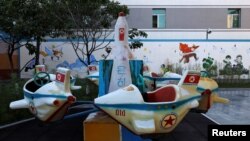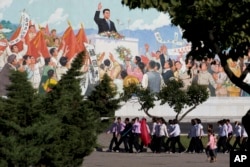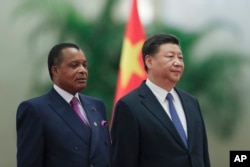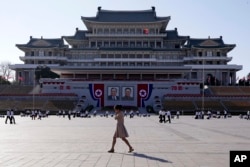Chinese President Xi Jinping's decision to turn down a reported invitation to attend a military parade in North Korea and celebrations marking 70 years since the founding of the isolated state may have helped him dodge problems on several fronts.
Were Xi to attend this weekend's events, as had been widely speculated in the South Korean media, analysts say that not only could it have fed into Washington's frustrations over a lack of progress toward denuclearization on the peninsula, but it could have heightened already tense relations on the trade front as well.
And if North Korean leader Kim Jong Un rolls out new military hardware as some expect — particularly weapons of mass destruction such as an ICBM — Xi's attendance could have sent other messages as well.
"It would not be very appropriate for Chairman Xi to appear on the podium standing next to Kim Jong Un under those circumstances," said Zhao Tong, a fellow at the Carnegie-Tsinghua Center for Global Policy. "That also could be interpreted as China indirectly recognizing North Korea's nuclear status."
Sun Yun is the co-director of the East Asia program and director of the China program at the Stimson Center, a research group in Washington. She said concerns include what military hardware will be on display this Sunday when Pyongyang marks its anniversary, and increased trade tensions. There also are some practical reasons as well, she says, noting that if Xi had gone, the trip would've come at the end of an eventful week.
From last weekend through Thursday, Xi had been busy meeting with a long line of African leaders. Beijing also hosted the Forum on China-Africa Cooperation on Monday and Tuesday. Sun said Xi is likely to go to Pyongyang in the future, probably when the situation has changed.
If and when he does go, it would be the first time for China's top leader to visit North Korea since 2005, when then-leader Hu Jintao traveled to Pyongyang.
"Postponing a visit by Xi to Pyongyang is a prudent decision by the Chinese, given both the current political climate around negotiations on trade and with North Korea and Xi's busy schedule this week," Sun wrote in a recent article, noting that since July, the U.S.-China trade war has cast a shadow over the interactions between China and North Korea. "Xi's trip would have taken place at a time when President [Donald] Trump is pointing fingers at China for..."[not] helping with the process of denuclearization" due to so-called trade tensions."
Some analysts believe Kim Jong Un is likely to follow in President Xi's footsteps and try not to step on any toes with provocative actions. Although Xi will not attend the gathering, China's communist party leadership is still sending a high-ranking official and showing its support for the celebrations.
Li Zhanshu, China's third-ranked official and a member of the Communist Party's Politburo Standing Committee, will attend the ceremony in Xi's place.
Wang Yang, another member of the seven-man Politburo Standing Committee, attended a gathering Thursday night in Beijing at the North Korean embassy, marking the anniversary a few days ahead of the celebrations in Pyongyang.
Rorry Daniels, an Asia security specialist, says "the fact that the Chinese are sending a high-level pretty powerful official says that China has received some kind of assurances that North Korea will not be debuting any new technology at this parade."
If it does, that would undermine China's narrative that it is playing a positive role in this process.
"The optics of a Politburo member standing next to evidence that North Korea has or is making progress in their nuclear program during the ongoing de-nuclear negotiations with the United States, to me it seems that China would not want that picture," Daniels said.
Still, analysts at 38 North, a website devoted to "informed analysis of events in and around" North Korea, say satellite images ahead of the event show the largest number of shelters in the heavy equipment storage area ahead of any parade since Kim Jong Un rose to power.
In its update, the website said, "While the number of shelters present isn't a definitive indicator, it suggests that Sunday's parade likely will be considerably larger than the military parade earlier this year."
Brian Kopczynski, Joyce Huang contributed.







